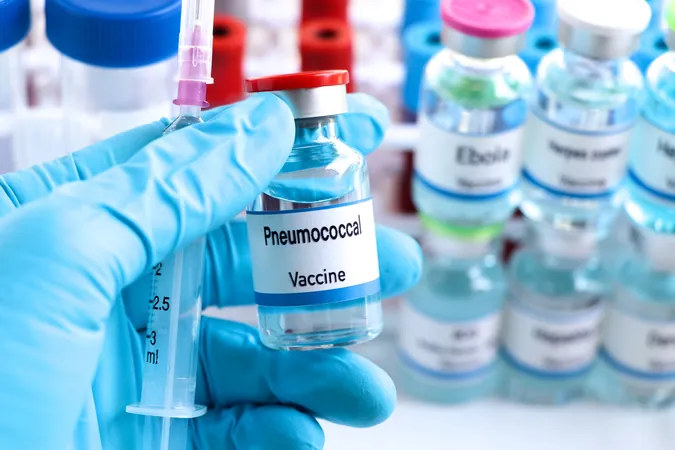
Revealing the Hidden Links Between Parkinson’s Disease and Your Gut: A Groundbreaking Study Uncovered!
2025-06-16
Author: Wei
A Deep Dive into the Gut Microbiome
Exciting new research is shining a light on the surprising connection between Parkinson's Disease and our gut microbiomes! Researchers have analyzed nearly 4,500 samples from patients around the globe, uncovering key changes in gut bacteria that may be tied to this debilitating condition.
Chemicals, Bacteria, and Parkinson's: A Troubling Connection
Conducted by the Quadram Institute and the European Molecular Biology Laboratory, the study employed advanced machine learning techniques to sift through a massive dataset. Not only did they identify the bacteria most linked to Parkinson’s, but they also discovered specific metabolic functions in the gut microbiomes of affected individuals that could lead to serious health issues. Alarmingly, they found that pathways associated with the breakdown of harmful chemicals like solvents and pesticides were notably abundant, reinforcing previous studies that have implicated certain environmental factors in the onset of Parkinson's.
Understanding Parkinson’s: More Than Just Movement
Parkinson’s disease, characterized by involuntary shaking and muscle stiffness, can have gut-related symptoms like constipation and gut lining inflammation that may appear decades before motor issues. This has sparked a growing interest in the role the gut microbiome plays in understanding, diagnosing, and perhaps even treating this complex illness.
The Quest for Microbiome Patterns
While previous studies have hinted at differences between the gut microbiomes of healthy individuals and those with Parkinson’s, results have varied widely. This inconsistency is not uncommon due to differing methodologies and participant populations around the world. Earlier research from the same team had begun to pinpoint common features of the Parkinson’s microbiome across continents, yet a clear consensus remains elusive.
Machine Learning: A Game Changer in Research
To make sense of the vast data related to trillions of gut microbes, researchers have harnessed machine learning—an extension of AI that helps identify patterns in large datasets. While some individual studies have hinted at accuracy rates up to 90%, the real challenge lies in applying these models to independent populations.
Enzymes and Environmental Toxins: What’s the Link?
A striking discovery from this latest analysis indicated that the microbiomes of Parkinson’s patients were enriched with genes responsible for breaking down xenobiotics—substances foreign to the body, such as pesticides and pollutants. The implications of this are profound: Could chemical exposure alter our gut microbiome, thereby affecting our neural health? And could this enriched microbial activity heighten the neurotoxicity of these substances?
Towards a Diagnostic Revolution?
Researchers have identified concerning traits of pathogenic bacteria that might lead to inflammation and a compromised gut barrier, which could allow harmful substances to enter the bloodstream and the brain. As individual microbiomes vary widely, this suggests that our gut health could either increase or mitigate our risk of developing Parkinson’s.
A Bright Future in Microbiome Research
Dr. Stefano Romano, one of the study's lead authors, emphasized that this research marks a major step forward in our understanding of the gut microbiome's role in Parkinson’s disease. With findings published in *Nature Communications*, the study shows promise not only for diagnostics but also for potential therapeutic strategies.
Conclusion: The Urgent Need for More Research
As our understanding of the gut's impact on neurological health continues to evolve, one thing is clear: more targeted research is essential. What exactly does our gut have to do with diseases like Parkinson’s? The answers could hold the key to new breakthroughs in treatment and prevention.




 Brasil (PT)
Brasil (PT)
 Canada (EN)
Canada (EN)
 Chile (ES)
Chile (ES)
 Česko (CS)
Česko (CS)
 대한민국 (KO)
대한민국 (KO)
 España (ES)
España (ES)
 France (FR)
France (FR)
 Hong Kong (EN)
Hong Kong (EN)
 Italia (IT)
Italia (IT)
 日本 (JA)
日本 (JA)
 Magyarország (HU)
Magyarország (HU)
 Norge (NO)
Norge (NO)
 Polska (PL)
Polska (PL)
 Schweiz (DE)
Schweiz (DE)
 Singapore (EN)
Singapore (EN)
 Sverige (SV)
Sverige (SV)
 Suomi (FI)
Suomi (FI)
 Türkiye (TR)
Türkiye (TR)
 الإمارات العربية المتحدة (AR)
الإمارات العربية المتحدة (AR)